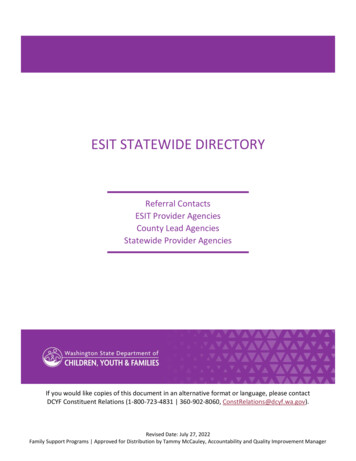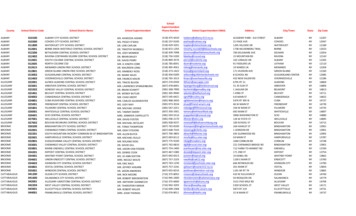
Transcription
GOVERNMENT OF THE DISTRICT OF COLUMBIADepartment of Health Care FinancePublic Hearing onB24-0115, the “Department of Health Care Finance Support Act of 2021”Testimony ofWayne TurnageDeputy Mayor for Health and Human ServicesandDirector, Department of Health Care FinanceBefore theCommittee on HealthCouncil of the District of ColumbiaThe Honorable Vincent C. Gray, ChairpersonWednesday, April 21, 202110:00 a.m.WebEx Virtual PlatformThe John A. Wilson Building1350 Pennsylvania Avenue, NWWashington, DC 200041
IntroductionGood morning, Chairman Gray and members of the Committee on Health. My name isWayne Turnage and I serve as the Deputy Mayor for Health and Human Services and the Directorof the Department of Health Care Finance. I am here today to discuss the impact of the“Department of Health Care Finance Support Act of 2021." Joining me are Melisa Byrd, StateMedicaid Director; Melanie Bell, Interim Chief Operating Officer and Operations Manager;Melanie Williamson, Interim DCAS Director and Chief of Staff, Don Shearer, Director of theHealth Care Operations Administration, and Lisa Truitt, Director of the Health Care Delivery andManagement Administration.The Mayor’s bill seeks to ameliorate issues that are now facing the Department of HealthCare Finance (DHCF) as a result of a Contract Appeals Board (CAB) ruling on a contract initiallyawarded as part of a solicitation for the Core Medicaid Management Information System (MMIS).In the CAB’s August 20, 2020 opinion, the three-judge panel found that the proposal for theselected winner of the contract was non-responsive for failing to submit a compliant subcontractingplan with its initial proposal, even though the subcontracting plan was submitted later in theprocurement process. Thus, the District’s contract award was overturned and the CAB decisionechoed through two other procurements for the Medicaid managed care program and the District’smajor automated eligibility system.It is critical to note that this CAB’s ruling runs contrary to the standing practice of theOffice of Contracting and Procurement (OCP) which, for more than a decade, has permittedofferors to submit a subcontracting plan when the District receives the last best and final offer(BAFO) from the offeror. If the Mayor’s bill is passed, this legislation will: (1) ensure that theDistrict is able to continue the procurement process for this limited set of solicitations under the2
longstanding District practice that existed at the time the Request for Proposals (RFPs) wereissued; (2) allow the District to implement or continue contracts with offerors meeting theexpectation of the Technical Evaluation Panel (TEP) and the Centers for Medicare and MedicaidServices (CMS) to provide the level of services required; and, (3) ensure there is minimaldisruption and cost impact on the progression of the three impacted contracts—Medicaid ManagedCare, the Medicaid Management Information System, and the District of Columbia AccessSystem—which are discussed further in my testimony. No other contracts will benefit from theMayor’s bill.Medicaid Managed Care Contracts (MCOs)DHCF has been operating the Medicaid and DC Healthcare Alliance (Alliance) programssince 2009 and 2001, respectively. Presently, the agency is working towards a morecomprehensive Medicaid managed care program and has redesigned the managed careorganization (MCO) contracts with a focus on: (1) securing health care value for Medicaidenrollees over a historical and disproportionate provider focus on volume, (2) achieving morecoordinated care to ensure that the totality of members’ health care needs are addressed, and (3)increasing access to care using every acute care hospital, clinic, and large physician practice planin the city.Effective October 1, 2020, the Medicaid managed care program was expanded to includepersons characterized as “non-dual Social Security Income (SSI)” adults, ages 21 and older, whowere previously served through the District’s Fee-For-Service (FFS) program. As shown in thegraphic on page 4, between January 1and December 31, 2020, over 1 billion in total net revenuewas paid to the four full risk-based MCOs that served the Medicaid and Alliance health planenrollees during all or a portion of this period.3
Net Revenue By MCO and Total DCHFP & AllianceProgram ( M)Net Revenue By MCO and Total DCHFP & Alliance Program ( M) 97.7 129.4 192.4Amerigroup*Total NetRevenue: 1BAmeriHealthCareFirstMedStar* 586.1Data Sources: Financial Condition values from MCOs’ Annual Statements as of December 31, 2020 filed with DC Department of Insurance Securities and Banking.Notes: *Amerigroup amounts represent 9 months of operation from January 1, 2020 to September 30, 2020 as Amerigroup's contract with the District ended September 30, 2020. MedStar began contractedservices as of October 1, 2020. Financial results shown for MedStar represent 3 months of operation from October 1, 2020 to December 31, 2020. For all MCOs, Total Capitation Revenue excluding HIPFpayments and DC Exchange/Premium Taxes. DC Exchange/Premium Taxes based on the MLR letters and calculations provided by the health plans.The MCO RFP Process. DHCF, through OCP, issued an RFP in January 2020 with thegoal of stabilizing its system of managed care by addressing chronic issues within the program,including the problem of adverse selection. In a managed care environment, adverse selectionoccurs when sicker members of the Medicaid population gravitate towards a single MCO, thuscreating an imbalance of healthy and sick enrollees across the three health plans. When sickerenrollees, primarily those with one or more chronic health conditions, disproportionately enroll inone plan because of the care and services offered, they increase the risk level for that health plan,generating escalating and ultimately unsustainable costs.In the new procurement, DHCF selected the following three MCOs for the award of newcontracts: AmeriHealth Caritas District of Columbia, Inc. (AmeriHealth); MedStar Family Choice(MedStar); and CareFirst BlueCross BlueShield Community Health Plan District of Columbia(CareFirst), formerly known as Trusted Health Plan. The new contract addressed problems withthe uneven distribution of high-cost members across the agency’s three health plans with a random4
redistribution of member assignments, and a provision that allows DHCF to reduce funding forany MCO in amounts that ensure the medical expenditures are least 85 percent of total MCOrevenue. Other provisions increase access to care through mandated universal contracting,emphasize the use of value-based payments, and expand care coordination. Additionally, it shouldbe especially noted that these contracts included over 78 million Small Business Enterprise (SBE)and Certified Business Enterprise (CBE) contracts.The implementation of these three contracts represented the most significant transition ofthe District’s managed care enrollees in the program’s history. As noted, all enrollees wererandomly assigned to one of the three MCOs, including those new enrollees who were previouslyserved through the FFS program. The graphic below illustrates the magnitude of Medicaid andAlliance members that received new health plan assignments under the transition. As shown,178,381 members were reassigned to new plans, including more than 16,000 former FFS members.More Than Seven Of 10 Members SwitchedHealth Plans As A Part Of DHCF’s TransitionFor The New ProgramHealth Plan Transition Status For Medicaid And Alliance Members As OfOctober 1, 2020*231,664Total Enrollees53,283(23%)RemainedIn SamePlan178,381(77%)Switched Note: *This number 178,381 members who “switched” plans, includes 16,664 Medicaid enrollees who were in the Fee-For-Service program but were moved to managed care.Source: Medicaid Management Information System15
To carry out this transition, DHCF took significant steps to engage enrollees andstakeholders, informing them of the planned transition. In addition, a concerted effort was madeto communicate with physicians in hospitals, large practice plans, and clinics on the importance ofensuring a continuity of care with the goal of preventing potentially dangerous disruptions inenrollees’ treatment plans. Finally, we established in-house call center services to supplementthose provided by the enrollment broker for the purpose of addressing concerns raised by anyenrollees who had questions about their new plan assignments.In light of these changes, the CAB’s ruling regarding the Conduent Protest on the MMISprocurement has created substantial challenges for the managed care contracts. Because the OCPContracting Officer is now required to apply the Conduent ruling to the managed careprocurement, any managed care contract that does not meet the requirements of this ruling, by law,must be treated as non-responsive, disqualifying that plan from any further review. Absent astatutory change, this standard must be applied even if the technical evaluation team has rated theimpacted proposal as one of the top three in the procurement.The illustration on page 7 shows the trajectory of events following the filing of the MMISprocurement protest, and how it ultimately impacts the managed care contract procurementprocess. Notice the CAB accepted a protest of the award of the MMIS contract on May 21, 2020.Approximately three weeks later, OCP notified the three health plans—AmeriHealth, MedStar,and CareFirst—of their selection by DHCF’s technical evaluation team. Within that same week,several protests were filed by the MCOs and the CAB accepted one such protest. Nonetheless,two weeks later, based on a request by OCP, the CAB ruled that DHCF could move forward withthe process of transitioning the plans into the program, which included the reassignment of morethan 178,000 members. This transition process would take nearly seven months.6
Key Activities In The Managed CareProcurement Timeline Which Have Created DHCF’sCurrent ProblemMay 21, 2020The CAB Accepts AProtest From ConduentOf OCP’s Decision ThatAllowed CBE Plans To BeSubmitted After InitialProposal For DHCF’sMMIS ProcurementJuly 9, 2020OCP Issues LegalSufficiency For MCOContractsOctober 1, 2020DHCF Completes FederalReadiness Review ForNew Contract And BeginsMoving Members To TheNew PlansJune 2-4, 2020OCP Notifies ThreeHealth Plans ThatThey Have BeenSelected By DHCF ForThe New ManagedCare ContractsJuly 15, 2020CAB Allows DHCF T0Move Forward With TheNew Managed CareContractsDecember 1, 2020CAB SustainsAmerigroup's’ProtestJune 4-6, 2020Several MCOs FiledProtests AfterNotification That TheyWere Not Selected ByDHCF For The NewManaged CareContractJuly 16-31, 2020Amerigroup FilesProtests ChallengingOCP’s Process,MedStar’s Scoring,And Carefirst’s CBEPointsJune 22, 2020June 26, 2020OCP Requests That DHCFBe Allowed To MoveForward And Transition ToThe New Managed CareContractsNon-Selected Health PlansChallenge OCP’s RequestTo Allow The MCOTransition Process ToBeginAugust 20, 2020CAB Sustains EarlierConduent ProtestRegarding TimelinessRequirements For The CBEPlans Referenced In TheDHCF MMIS ProcurementSeptember 3, 2020Amerigroup Files AnotherProtest Challenging TheResponsiveness OfMedStar’s ProposalDecember 2, 2020Without LegislativeChange, OCP InformsDHCF That MedStarMay Be DisqualifiedBecause Of CAB’sConduent Ruling2It was during this period that the CAB issued a ruling sustaining the MMIS protest thatinvalidated OCP’s interpretation of the CBE law, before later sustaining Amerigroup’s protest ofDHCF’s award of the MCO contracts. This last decision came after the agency had completed thereassignment of the health plan members. More critically, evidence emerged that the CAB’s rulingon the MMIS contract could invalidate DHCF’s award of one of its MCO contracts to MedStar.In the absence of legislative action, this confluence of events leaves DHCF with twooptions. The first would be to accept Amerigroup into the program and move the members whohad been reassigned to MedStar to this plan. Of course, this would require that MedStar’s morenearly 65,000 enrollees be reassigned to Amerigroup, another health plan yet again, and within 12months of the previous transition (see graphic on page 8). Such an action would be bothunprecedented and highly disruptive to both Medicaid and Alliance members. Equally significant,many of these members now rely upon the MedStar Health System for their care. ShouldAmerigroup be added to the program, we have no guarantees that the health plan will be able to7
Unaddressed, The CAB Decision Will Require DHCF ToChange The Health Plan Assignments, Yet Again, For MoreThan 64,000 MembersHealth Assignments For Medicaid And Alliance Members As Of December 1, 2020Total Enrollees231,664AmeriHealth44%CareFirst28%MedStar FamilyChoice28%Government of the District of ColumbiaNumber of EnrolleesWho Must Be MovedTo Another Plan IfMedStar’s Proposal IsConsidered NonResponsive64,865Department of Health Care Finance5Source: DHCF’s Medicaid Management Information Systemsecure an agreement with the MedStar Health System. In fact, history suggests they will not. Sucha failure for a second time will leave many of the members in the plan without access to theirhospital and physicians of choice. This is a program risk that DHCF is not willing to take.Hence, if the Mayor’s bill is not passed, DHCF’s second and best option, essentiallyreflects a Hobson’s choice—requiring that we proceed with only two health plans in the program.Under this approach, the members who are currently enrolled in MedStar would be allowed toselect a new plan from the remaining two MCOs. While they will be required to switch plans, themembers will at least have the benefit of enrolling in a MCO that has precisely the same networkof providers who are contracted with their current plan.Still, the members must be moved for a second time and this comes with its own set ofstressors for some of the District’s most medically fragile residents. Further, DHCF will need toallocate system hours from our contracted Fiscal Agent to conduct a mass transfer of enrollees8
from MedStar, randomly reassigning members who do not make a health plan selection amongstthe two remaining health plans.In addition to the stress and confusion that may be placed on the managed care populationwith another transition, this process will cost the agency more than 1.3 million due to increasedhours of operation, additional staff to manage enrollee phone calls, and the production of revisedor updated outreach materials (see lLabor 134,992.62 128,564.40 128,564.40 141,420.85 533,542.28Postage 399,855.27--Fulfillment 353,853.74------ 353,853.74 1,355.09 10,530.64 10,530.64 10,530.64 42,946.99 900,056.72 139,095.04 139,095.04 151,951.48 1,330,198.28ODC'sTotal Costs 399,855.27Postage (includes mailing for one postcard, three letters, and welcome packages)Fulfillment (includes printing for postcard, letters and welcome package materials)Labor/Staffing (includes addition of a Supervisor and 16 temporary Customer Service Representatives (CSRs)Language Line (additional costs)Medicaid Management Information System (MMIS)MMIS, the claims payment system for DHCF, is a necessary and crucial system that fulfillsone of the core administrative functions the agency. MMIS has a role in both the FFS and managedcare programs in that the system uses an extensive verification and edit check process to receive,review, approve or deny payment for health care claims submitted directly by Medicaid providers.In addition, the system is used to process monthly capitation payments to the MCOs for thebeneficiaries in their respective health plans. Finally, MMIS is instrumental in the generation ofrequired CMS reporting. In summary, approximately 95 percent of DHCF’s 3 billion budgetpasses through the MMIS and is subsequently allocated to provider payments.Historically, the procurement approach for MMIS was to solicit one claims processingsystem with multiple subsystems from one vendor. However, DHCF’s federal regulator rejected9
the agency’s proposed traditional approach in February 2014. Instead, CMS adopted a newstrategy for the design of Medicaid MMIS requirements for state Medicaid programs. Respondingto concerns about the amount of time and money required to implement and support monolithicsystems—namely, the slow return on investment and the paucity of available vendors, CMSdirected states to separate the MMIS into modules and to implement these subsystems separately.To meet the modularity design requirements imposed by CMS, DHCF procured separatecontracts to implement various functions, including case management, provider enrollment,pharmacy benefit manager, electronic visit verification, third party liability, and the Medicaid datawarehouse. The remaining component to complete the full transition from a monolithic system toa modular system is the procurement of the Core MMIS. The Core MMIS will become the hubfor the other modules that make up the Medicaid Enterprise System. The graphic below illustratesthe future MMIS enterprise. The modules on the left side will have batch and/or real time exchangeof data with the Core MMIS.DC’s Future MMIS EnterpriseEnrollmentDataNew MMIS CORE OfferingMCO EnrollmentBrokerPA Data EntryPaper ClaimsElectronic KeyingSystemQIOPharmacyEncounter DataMMIS WebPortalPBMProvider EnrollmentDataProvider DataManagement SystemRecipient, Provider,PA, & EligibilityDataClaims - Reference –Financial - Recipient TPL - Managed CareCase ManagementSystemElectronic DocumentManagement ligibilityDataDCASProvider Payment &Eligibility DataEHR10CorrespondenceTracking System
The modular approach allows the District to secure systems that are built specifically forthe required function. For example, with the monolithic system, the current MMIS vendor(Conduent) processed provider paper applications after staff at DHCF reviewed and manuallyscreened the documents. With the implementation of the provider data management system(PDMS), providers submit completed applications through an online portal and the providerscreening is done through an automated process. It is a more efficient system and process thatallows DHCF to respond timelier to provider inquiries related to enrollment.Likewise, when DHCF implements new benefit or reimbursement methodologies, ourcurrent fiscal agent and system operator must engage its programmers to make the changes.Depending on the scope of the change, this process can take weeks. Our goal for the new CoreMMIS is to procure a system where these changes can be made and tested through online screens,allowing DHCF to be nimbler and more responsive to changes—nearly in real time.Finally, because we are procuring a commercial off the shelf (COTS) product, weanticipate reduced costs to the District when implementing new federal mandates. The vendor willbe required to add new federal requirements to the system and work with DHCF to implement thechange, without additional costs.The Procurement Process For MMIS. OCP issued the Core MMIS RFP on February 12,2019, and the contract was subsequently awarded to DXC Technology Services, LLC on March31, 2020. The approved CBE planned spend for DXC Technology Services, LLC was 35 percentof 76,547,415 or 26,791,596. On April 14, 2020, Conduent filed a protest resulting in the OCPissuing a Stop Work Order on April 17, 2020. Subsequently, Conduent filed a supplementalprotest that was sustained by the CAB. Per the CAB’s August 20, 2020 Opinion, the District wasordered to: “(1) terminate the contract awarded to DXC under the solicitation; (2) re-evaluate the11
offerors’ proposals in accordance with procurement law and the solicitation, consistent with theCAB’s decision, and award a new contract under the solicitation, or re-procure for the subjectMMIS system and services; and (3) report to the Board on the status of the District’s complianceas ordered herein within thirty days.” Consequently, OCP issued a contract termination letter toDXC on September 15, 2020. The procurement remains open and DHCF has not completed itstransition from a monolithic system to a modular system.The cost of building a new MMIS claims system can range anywhere between 75 to 100million depending on requirements. In Fiscal Year 2015, when DHCF began the procurement forthe Core MMIS, the anticipated cost was 60 million. However, by Fiscal Year 2020, theprocurement estimate reached 80 million. If DHCF is required to begin the process of a newprocurement for the MMIS project, there will be a further increase in the cost of the award due tothe complexity of the MMIS.As this legislation allows the District to accept the submission of a subcontracting planfrom an offeror when the District receives the last best and final offer (BAFO) from the offeror forcertain DHCF solicitations, should it pass, the District will be able to move forward with the MMISprocurement, thus preventing the cost increases associated with a new procurement.The District of Columbia Access System (DCAS)DCAS is a major DHCF IT project that was launched in 2012 and is now near completion,despite the existence of multiple challenges and setbacks throughout the project’s history. Oncefully implemented, DCAS will streamline eligibility and enrollment for a substantial number ofhealth and human services programs offered in the District, through a state-of-the art, integratedhealth care and human services eligibility and enrollment platform. This platform also includesboth an insurance marketplace and enhanced case management capabilities.12
Upon completion, residents will be able to access applications for both health careprograms and food or cash benefits through a single-entry point and integrated application, insteadof the current time-consuming process that involves multiple systems and steps. DCAS will alsoprovide caseworkers with a new, holistic view of eligibility by centralizing access to informationrequired for eligibility determinations, thereby reducing the level of manual effort needed todetermine eligibility, and the need for in-person visits to service centers.To minimize the level of service disruption to residents, DCAS has been developed in threemajor phases, or “releases”: Release 1 (R1) of the project, which focused on building and deploying the health insurancemarketplace and Medicaid functionality needed to determine eligibility for individualsusing the new Modified Adjusted Gross Income (MAGI) standards, was rolled out onOctober 1, 2013. This phase established a platform for streamlined eligibilitydeterminations for individuals seeking private, subsidized, or public insurance, usingeligibility rules for Insurance Affordability Programs such as advanced premium tax creditsand cost sharing reductions. Release 2 (R2) was designed to focus on the components needed to establish functionalityfor the District’s Cash and Food benefit programs. This module includes eligibility andrenewal functionality for various versions of the Supplemental Nutrition AssistanceProgram, and the Temporary Assistance for Needy Families Program. In sum, this moduleaddresses technical issues creating barriers to accurate SNAP and TANF functionality.When DHCF assumed control of the project in October 2016, the project wasunderperforming. Since then, a focused team of IT experts has been engaged in theongoing stabilization of R2, as additional development and system integration continues. Release 3 (R3) builds upon the functionality that was deployed in R2. R3 incorporates thefunctionality needed for eligibility processes for the Medicaid non-MAGI population –otherwise known as Medicaid long-term care. While the R3 design phase began in January2018, several factors ultimately pushed its launch date to the now rapidly approaching dateof July 2021.The graphic on the next page offers a snapshot of the trajectory of each Release, and itscurrent status while providing a roadmap to the many programs that benefit from the advancedtechnology being developed to expedite eligibility and case processing.13
DCAS ProjectStatus APTCMAGIMedicaidQHP(PremiumTax Credits)SHOPEligibilityRELEASE 1 RELEASE 2Cash ctionalFully FunctionalIn RemediationRELEASE 3 JulyDeployment Non-MAGI Medicaid Long Term Care TEFRA/KatieBeckett Breast and CervicalCancer IDD, EPD, IFSWaivers Spend-Down AugustDeployment Case AuditProviderIntakeInterfaces w/DMV, BOE,OCFO, USPS,Care singThe Procurement Process for DCAS. The CAB ruling on the MMIS procurement alsoimpacted the DCAS procurement which is now being held in abeyance pending the outcome ofthe Mayor’s proposed bill. DCAS procurements largely fall into three broad categories: (1) designand development; (2) operations and maintenance and application development; and (3)miscellaneous services (software, marketing, strategic consulting). In addition, each of the threeReleases is managed by a diverse team of contractors procured through staff augmentation andother vehicles to supplement the work of full-time District employees.In late 2019, DHCF sought to leverage a single vendor to manage the IT staff that wouldaccelerate the remediation of R2 and issued an RFP solicitation on July 14, 2020. On November25, 2020, Trillian Technologies, Inc. (Trillian) filed a protest challenging the District’s proposedcontract award to another vendor that ranked behind Trillian in the scoring of proposals.Consistent with the CAB’s August 20, 2020 ruling in the MMIS procurement protest, after scoring14
and prior to award, the Contracting Officer rejected Trillian’s proposal as non-responsive forfailure to submit the compliant subcontracting plan required by the RFP and the law.Trillian sought to overturn that action, arguing that it had submitted a proposal three daysbefore the CAB’s ruling, in reliance on “the District’s historical interpretation of its laws and bestprocurement practices.” On February 24, 2021, the CAB found that the District had properlyrejected Trillian’s proposal as non-responsive given its prior ruling in the Conduent matter anddismissed Trillian’s protest. Notably, the CAB stated that Trillian was itself a CBE and notrequired to contract with other such entities, however, because it noted an intent to subcontractwhen it responded to the RFP, it thereby needed to submit a compliant and complete subcontractingplan in accordance with the law and the MMIS ruling.The proposed legislation would ultimately invalidate the Contracting Officer’s action,thereby changing the result of this protest, and make Trillian—the highest scoring offeroraccording to the CAB’s opinion—eligible for the award, as well as possibly also other vendorsthat may have been excluded. Because the legislation changes the outcome significantly, theDistrict’s proposed award to the second-place bidder has been put on hold pending the outcome ofthis legislation. Should the legislation not move forward, however, DHCF would be forced tomake an award that potentially excludes vendors with better management, more expertise, highervalue, or better prices. As described in detail above, these were the precise reasons DHCFexecuted the solicitation. Moreover, while the legislation is pending, DHCF must try to obtain theresources and expertise that would have been provided under this contract—a necessity thatcontinually adds to project cost.The additional cost of delaying moving this legislation forward are significant, althoughthe precise amount is unknown.Any delay in DCAS contracts can cause either federal15
disallowances or a suspension of funding from federal partners due to the District’s inability tomeet project requirements timely. Delays can also trigger an increase in local funding participationrequirements and a shift in cost allocation for this project. This problem will be activated ifimplementation is pushed into Fiscal Year 2022. While delays in the procurement may havealready exposed the District to additional cost, putting the legislation in place quickly wouldminimize impact and ensure the District completes the project timely with the services of the mostcapable and cost-effective bidder.ConclusionMr. Chairman, in closing, the CAB’s ruling is of consequence to the major contracts inDHCF and will have extraordinary implications for DHCF’s Medicaid program. Indeed, the OCPrule governing the submission of contracting plans has existed for many years, but because of themanner in which the agency has interpreted the law, vendors have developed a reliance interest onthe agency’s policies.For DHCF, executing this change now and, impacting procurements that proceeded theCAB’s August 2020 ruling, will result in significant cost and considerable disruption, given thenature of the programs and IT projects that these contracts support. On the other hand, there wouldbe no impact to the CBE community if these contracts were awarded to the vendors that wereoriginally selected. In fact, such a decision would have upheld and furthered the purpose and intentof the subcontracting law with a multi-million dollar infusion of funds to the CBE community,according to the vendors’ final CBE plans. We respectfully request the Committee on Health’ssupport for the Mayor’s bill to minimize further adverse impact to DHCF.Thank you for allowing me to testify and my staff and I are pleased to receive yourquestions.16
GOVERNMENT OF THE DISTRICT OF COLUMBIA . 2020 filed with DC Department of Insurance Securities and Banking. Notes: *Amerigroup amounts represent 9 months of operation from January 1, 2020 to September 30, 2020 as Amerigroup's contract with the District ended September 30, 2020. . The first would be to accept Amerigroup into the program and .











